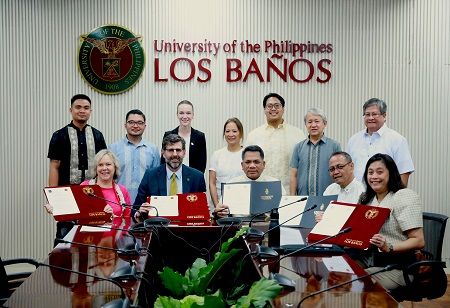-
The University of Guelph and the University of the Philippines Los Banos (UPLB) recently signed a re-newed memorandum of understanding (MOU) that builds upon a long-established relationship opening gates to student research collaborations, emerging postgraduate courses and scholarships, collaborative research networks and novel knowledge exchange between the Philippines and Canada.
Famous for its image in agriculture, life sciences and environmental studies, UPLB is a natural counterpart for U of G and its Ontario Agricultural College (OAC), with 150 years of history in agri-food research and innovation. The MOU was signed by UPLB and a U of G delegation to the Philippines, co-led by Dr. Ben Bradshaw, assistant vice-president (graduate studies), and Dr. Helen Hambly, professor of rural development in OAC. Hambly states food security and sovereignty having high-quality, local, and affordable food – are a common objective between the two countries that the collaboration will tackle.
"U of G has the chance to gain from UPLB's strong people-centered research responsible and inclusive knowledge-gathering that turns students into global citizens", Hambly states. We also have the chance to export U of G's skills to assist the Philippines to solve some of the urgent issues in the agricultural industry, including enhancing resilience to the climate, particularly for small landowners, and managing the outbreak of African swine fever, which the country first detected in 2019", Bradshaw added.
"Delegation is one of the University of Guelph's initiatives to collaborate with top research universities globally, as we aim to meet global challenges", states Dr. Stuart McCook, assistant vice-president (international). "We have a common bond in UPLB's long history of focus on research in food security and sovereignty, One Health, sustainability, communities and social justice, making them a natural fit for the University of Guelph in the Philippines". This visit has reiterated a platform for future cooperation in these domains.
The signing of the MOU comes after several years of partnership development by UPLB and U of G, OAC and the One Health Institute. It is an extension of UPLB's initiative under the leadership of the Philippines-Canada Network for Sustainability (PCNS), a network of higher education institutions between the two nations, supported by the Canadian Embassy in Manila. While traveling, U of G representatives met with different government agencies, such as the Philippine Department of Science and Technology, Bureau of Agricultural Research and Commission on Higher Education.
"These opportunities are important to cementing Canada-Philippines relations in the face of heightened global trade", Hambly says, "Since the Canadian government has made it very clear we need to diversify our trade relations."
Hambly's effort in the Philippines, in collaboration with the non-profit Forest Foundation Philippines, is in favor of women- and youth-led nature-based climate adaptation solutions in the rural sector of the Philippines. She stresses the reciprocal advantage of the new partnership, especially for U of G students who can complement their learning by acquiring knowledge from Filipino communities.
"When students are learning about climate adaptation and biodiversity in a country as diverse from their own as Vietnam, they realize the differences and similarities and where we can collaborate", says Hambly. ‘Experiential learning like that is so important in an era of AI’.
Other U of G representatives were: Francis Jabile, MSc capacity development and extension student; Carina Lang, research development manager in the College of Social and Applied Human Sciences; and Dr. Grace Nichol, recently graduated PhD in population medicine with specialization in One Health.
The integrated study of human, environmental and animal health are also central to this collaboration and would complement both universities' One Health teaching and research initiatives. We must think creatively about how we could work together on training that leverages our increasing ability for remote learning but still includes technical, even hands-on, components that are necessary to solving One Health issues", Bradshaw explains.
Canada and the Philippines, with their differing geography, have the same challenges, Hambly says. Almost half of Filipino families suffer from food insecurity, a problem that increasingly impacts many Canadians in the midst of rising food prices. Both countries are also facing the effects of climate change on their bio diverse landscapes and rural communities. With over 7,500 islands, the Philippines needs innovative, resilient agriculture practices that can benefit vulnerable areas – something U of G is well-positioned to provide and benefit from through research in rural and remote communities. With this new collaboration, U of G and UPLB plan to prepare the future agricultural leaders to tackle the world's most pressing challenges.
🍪 Do you like Cookies?
We use cookies to ensure you get the best experience on our website. Read more...

